SOUTH AFRICA. White outlaws, or who awaits Russian officers in Africa (part 5)
In my humble opinion, it is not a sin to remember at least some Russian volunteers by name. And no matter how hard the network experts, who visited South Africa on a tour with a cocktail tube in that place, talked about the country and its conditions, the memoirs of the fighters who wrote their names in blood, not the keyboard, are somewhat more valuable.
Unfortunately, a thorough registration of volunteers Transvaal government spent only the first months of the war. Later, the authorities simply did not have such an opportunity. Russian recorded naturally only by name and surname, without specifying the patronymic, unaccepted in many countries. Therefore, it is impossible to name the exact number of Russian volunteers, just as it is impossible to indicate the exact number of the dead.
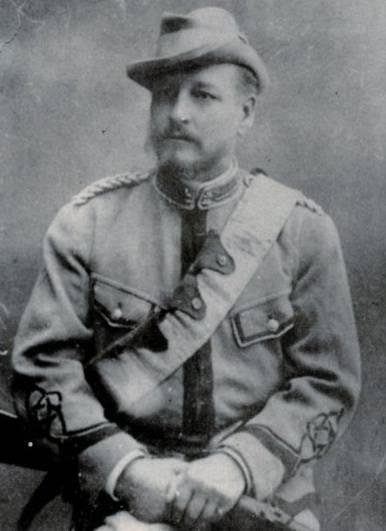
True, the most famous Russian volunteer was Yevgeny Maximov. Born Eugene 4 March 1849, in Tsarskoye Selo in the family of a naval officer. He studied at the St. Petersburg gymnasium, then at the Technological Institute, from which he transferred to the law faculty of St. Petersburg University. As a result, he entered the military service. At the age of 26, Maximov retired with the rank of lieutenant colonel, using the reputation of an immaculate but strong-willed and very independent officer. But Eugene, oddly enough, stubbornly did not want to leave the war without his person. First, he went to war in Serbia, continued fighting in Bosnia and the mountains of Herzegovina, was awarded the Serbian silver medal "For Bravery". With the beginning of the Russian-Turkish war 1877 of the year, having no other opportunity to get into theater, he returned to service.
In 1890, he fought as a part of General Skobelev's troops in Central Asia, for which he was awarded the Red Cross Badge. During the Italo-Ethiopian War of 1895, the indefatigable officer fought as part of the Ethiopian army as a military commissioner in the Russian Red Cross unit. With the beginning of the war of Greece and Turkey, Maximov, who has the strength, rushed to this fight, but was just late for the war.
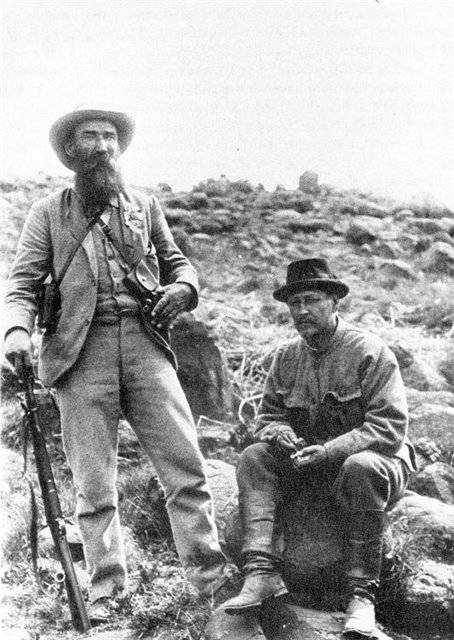
Evgeny Maximov and General Kolbe
In 1900, he arrived in Transvaal. At first he commanded the “Foreign Legion” (a team of volunteers from different countries), but as a regular military quickly got tired of all kinds of squabbles inside the legion, when each national squad honored themselves and despised the rest (greetings from the marauding Ricardi), and handed over command to the legion to Commander De la Ray (brother of the famous general). Soon, Maximov took the helm of the “Dutch Corps”, which was distinguished by discipline against the rest of the detachments. Actively participated in many bloody battles, was contused, besides was wounded in the temple and scapula. In May, 1900, he was promoted to the title of fencing general (combat general).
As a seasoned military man of war, he was extremely difficult with romantic young men and especially with the then “golden youth” from among the aristocrats, whom he considered unnecessary in battle. For example, Maksimov called Prince Bagration-Mukhransky, who came to South Africa in a kuladzha and Circassian circle, as a clown. In fact, despite the prince’s desperate courage, his Georgian national arrogance, which on the battlefield did not mean anything, looked like some posturing. This clinical intolerance to the rich and thirsty adventures of young people eventually led Maximov to the dock. In 1902, the battle general was summoned to a duel by Prince Sain-Wittgenstein-Berleburg. Maksimov avoided a duel with a young, arrogant aristocrat in every way, but the prince nevertheless achieved a meeting in which, naturally, he was safely shot. After that, the fencing general was tried, but taking into account his merits and the whole iconostasis of orders and medals, he was first sentenced to 2 years, and later completely released.
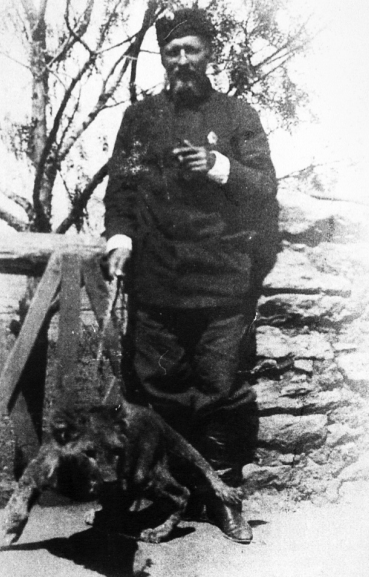
Maximov in Manchuria with a hand lion on a leash
The battle officer, who devoted all years of his life to defending the Motherland and justice in the literal sense, October 1 of the year in the battle of Mukden, will lay down his wild head.
Many memories of the Anglo-Boer War left Eugene Augustus, who came from the peasants of the Courland province. Born 4 December 1874, graduated from the course of the cadet school, becoming a second lieutenant of the Belgorai reserve regiment. About six months he fought in the Transvaal with the Boers against the British, participated in night raids, was part of the Boer commandos. In the ranks of these squads he was promoted to the rank of lieutenant. According to reviews of the Boers themselves, he was extremely enterprising and was distinguished by courage.
During the tragic defense of Pretoria against the superior forces of the British, he was wounded and captured. After returning to Russia, he was again accepted to military service in the 192-th Reserve Vavr regiment. At the time of stay in South Africa, Augustus was in the reserve. Later he participated in the Russo-Japanese War, and 1908-1909 performed reconnaissance missions as part of a special detachment of the Siberian Regiment in Mongolia. He published several works on the Boer War - "Memories of the participant in the Boer War 1899-1900 of the year." Further, his path is lost.
The tragic fate went to Boris Andreevich Strolman, who was born on July 18, 1972 in the Moscow province. After graduating from the Naval School (Naval Cadet Corps), he became a naval officer, rising to the rank of lieutenant fleet. In January 1900, a career officer who served on a number of ships from the Boyarin corvette to the Pamyat Azov cruiser resigned and was immediately sent to Transvaal.
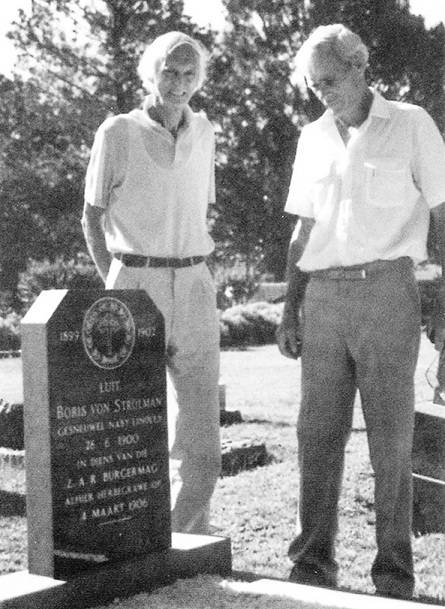
The grave of Boris Strolman, near two Boer professors
Despite the fact that many volunteers after the fall of Pretoria began to go home, seeing no point in fighting, Strolman did not even think about it. He joined a partisan detachment under the general administration of Christian Devet (De Veta), where he quickly earned a reputation as a literate and desperate fighter. An English bullet hit a Strolman in the vicinity of Lindley. Boris returned to the front line right after he took the wounded Dutchman from him. An attack followed, the body of a brave volunteer to his comrades Shulzhenko and Guchkov (one of the famous brothers, most likely Alexander) could not be taken out. Strolman was buried by a Boer woman from a neighboring farm. What kind of prestige and love Strulman enjoyed is indicated by the fact that in 1906, he was reburied with all honors in Pretoria.
An extremely interesting and already somewhat comical fate fell to the lot of a certain Nikolaev. His biography is foggy. Nikolaev arrived in South Africa, apparently, under a fictitious surname from Kiev. In Kiev, he served in a commercial institution. Nikolayev whistled a large sum of money from the general cash register, but instead of squandering them on the Paris confused and liters of champagne, this strange rogue knew where the Montenegrin detachment gathered, armed them, released a generous salary, and drove off to the war in Africa.
Burov, and our volunteers, was introduced into a stupor by the very appearance of a somewhat obese person with timid eyes, in front of whom a hefty athletic Montenegrins were building up their hats. Nikolaev by nature made an impression of a romantic and impetuous man, who was simply impressed to wear the title of commander of a separate detachment, and not a state clerk, and even in Kiev. Returning home, he, of course, was arrested and sent to the Kiev district court.
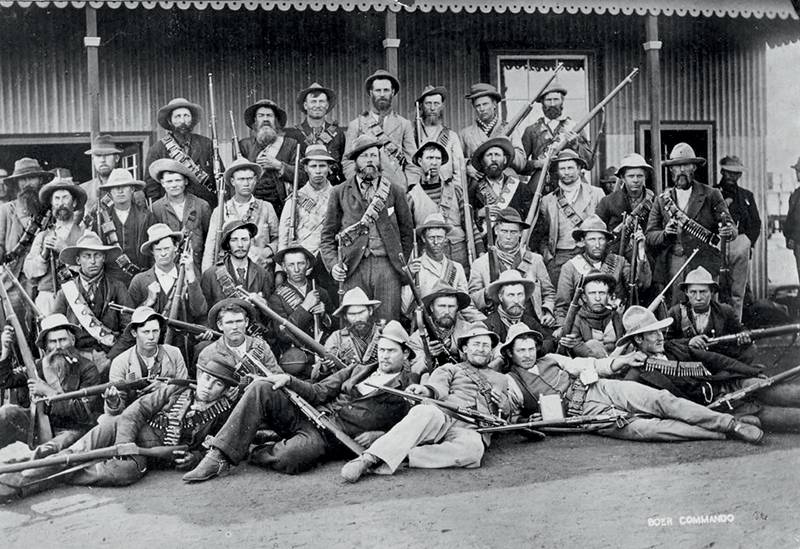
Another hero of Transvaal was Alexander Shulzhenko. Before the war, Shulzhenko served in the landmine company in the rank of captain. He took an active part in the device minefields in Vladivostok, Port Arthur and in the Crimea. Like many military in order to take part in the war in the Transvaal, went to the reserve. First he fought in the Russian detachment of Captain Ganetsky, and later, after the collapse of the detachment, he continued the war in the partisan detachment of the famous Boer Commander Theron.
Shulzhenko will enter history as the last Russian partisan. Distinguished by infinite courage on the verge of recklessness in the heat of battle, Alexander won fame among the Boer commandos. 5 May 1901 was captured by the British after all and spent a whole year in British dungeons, which differed little from the concentration camps for the Boers. According to some reports, he died in the Russian-Japanese war.
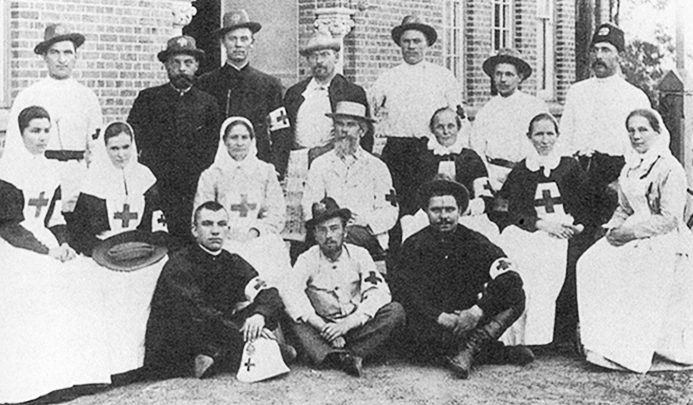
Detachment of the Russian Red Cross Society
In total, our volunteers were over 250 people (often the number 225 appears), not counting the doctors and sisters of mercy of the Russian-Dutch marching infirmary. It is difficult to describe the amazing, full of warmth and courage of the fate of our volunteers within the framework of this material. Yes, and how to choose who is more worthy if almost everyone is worthy. Worthy and Alexei Diatroptov, a former railway officer of the Tver province, freethinker and a brave fighter who was injured. And the former lieutenant, and in the Boer army, the captain of the partisan detachment, Leonid Pokrovsky, who died from a severe injury to 25 on December 1900 of the year on Paardeport farm. And Sergei Dreyer, a lieutenant who fought in the Transvaal and was contused in the defense of Pretoria. And Second Lieutenant Vasily Nikitin, an outstanding officer, who returned to his homeland after the fighting, but did not enjoy peace for long, will die in battles with the Hunhuzi in China.
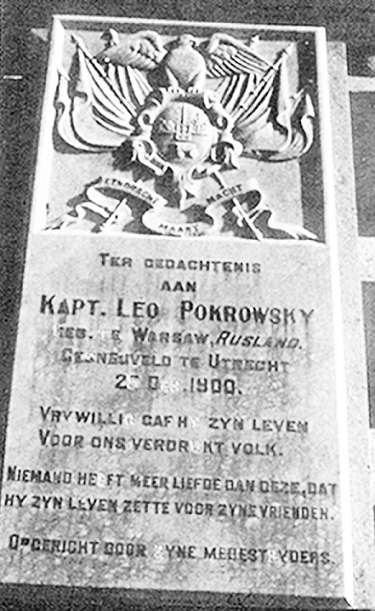
Commemorative marble slab dedicated to Leonid Pokrovsky, whom the Boers knew as Leo
Let's not forget the unloved Maximov Prince Nikolai Bagration-Mukhransky, who, not being a military man, was an excellent shooter and a strong man, while he inspired only by his appearance of the Boers, who took him for the Cossack. Niko, as his friends called him, a desperate proud man, even in captivity brought the British to white heat with eternal accusations of war crimes, perfidy and militarism.
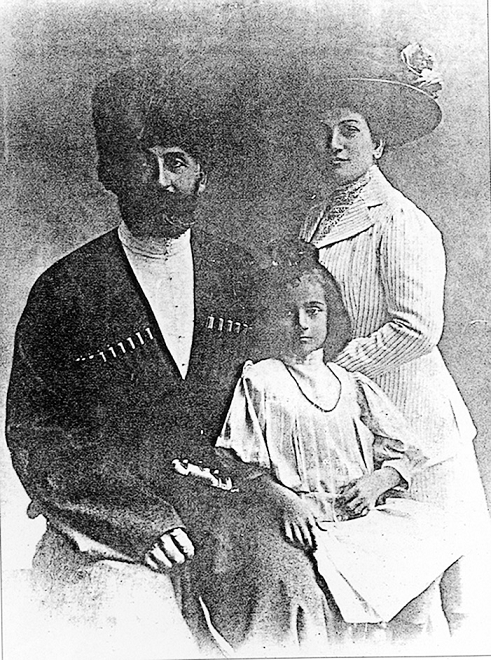
Nikolai Bagration-Mukhransky with his family
About half a year of their lives were given to the Transvaal by the Guchkov brothers, Alexander and Fedor, who fought in the well-known company commandos Krugersdorp.
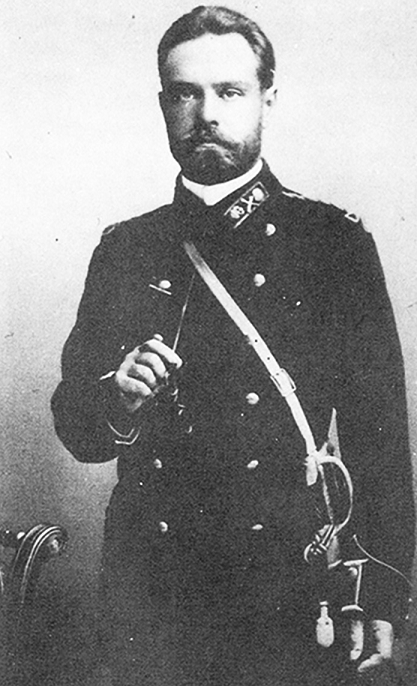
Alexander Guchkov during the war in South Africa
There were a lot of volunteers undeservedly forgotten - high school student Kalinovsky and peasant Kumantsev, Lyapidevsky and second lieutenant Dashkov, Akoshkin and Duplov who died in battle, also dead Petrov and engineer Semyonov, who later became the main architect of Moscow and the author of plans to restore Sevastopol and Stalingrad, Rostov -on-don and Smolensk.
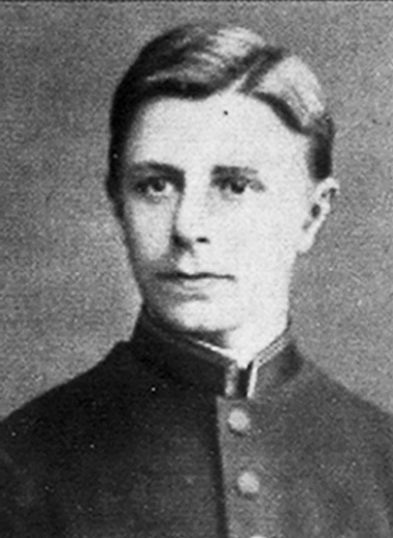
Young engineer, future architect Vladimir Semenov
Every year, these names are erased and forgotten. The modern government of South Africa, which overthrew the Ministry of Education, like many other ministries, turning them into tribal fiefdoms, these people are nobody. The only ones to whom they are dear are the Boers themselves, who have had a good education, such as the writer and publicist Dan Roodt (more about him next time), who is well acquainted with the history of Maximov and the Guchkov brothers. Unfortunately, even our home-grown clever people are poorly aware of the need to know their history and the importance of at least keeping in mind the presence of such promising allies as white South Africans in a strategically important region, through whose ports hundreds of ships pass.
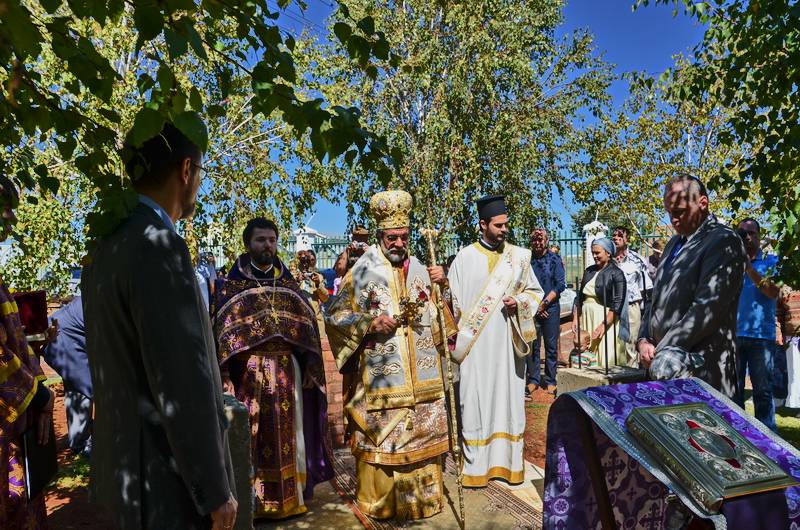
And the last detail. October 6 2013 in Johannesburg was consecrated a chapel in the name of St. Equal-to-the-Apostles Grand Duke Vladimir, erected in memory of the Russian volunteers who died in South Africa during the Anglo-Boer War 1899-1902. The laying of the chapel and its consecration took place at the confluence of the small Russian diaspora and even fewer survivors of the white South Africans after democratization.
To be continued ...
- Eastern wind
- White outlaws, or who awaits Russian officers in Africa (part 1)
SOUTH AFRICA. White outlaws, or who awaits Russian officers in Africa (part 2)
SOUTH AFRICA. White outlaws, or who awaits Russian officers in Africa (part 3)
SOUTH AFRICA. White outlaws, or who awaits Russian officers in Africa (part 4)
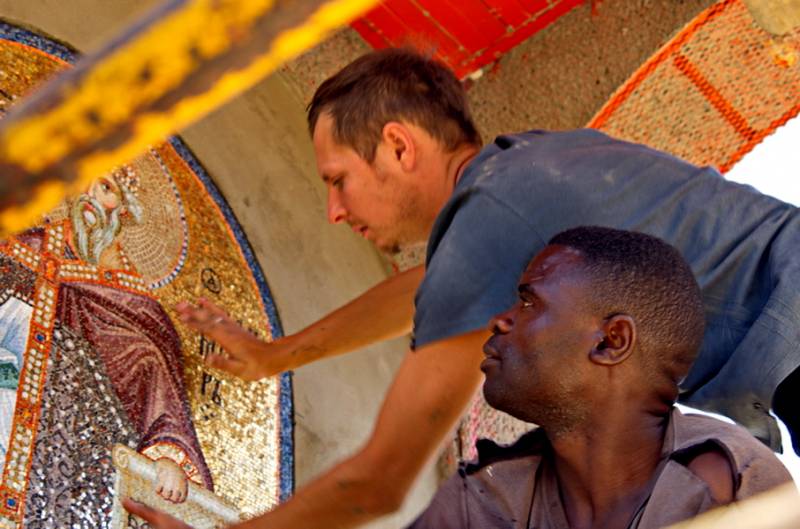
Information